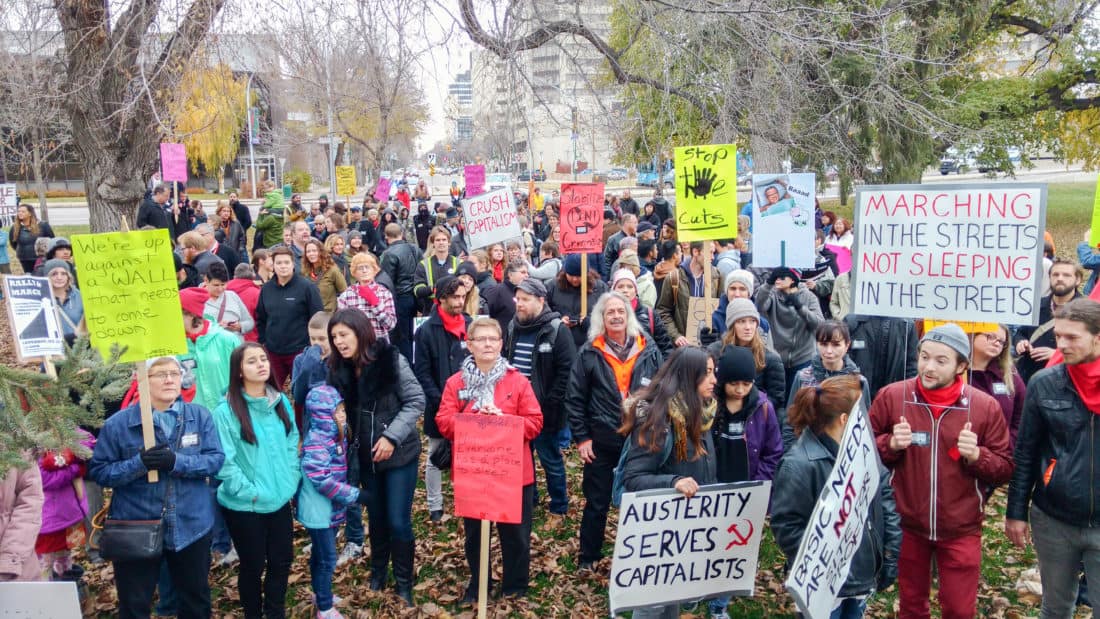On Oct. 22, hundreds of community members, including University of Saskatchewan students and then mayoral candidate Charlie Clark, marched the streets of downtown Saskatoon in support of the Lighthouse Supported Living Inc., following provincial government cuts to their stabilization unit.
The Lighthouse is a non-profit housing organization that provides supportive, transitional and emergency housing for the Saskatoon community. The stabilization unit, opened in 2013, features 38 beds open to anyone under the influence of drugs and alcohol who does not need medical attention.

Hundreds of protesters, including students Myda Khan and Nicholas Marlatte, marched the downtown core to support the Lighthouse.
In late September 2016, the provincial government cut funding to the stabilization unit, eight months after the unit reduced its opening times due to funding constraints, moving from 24 hours to 16 hours overnight.
Before the march, community organizer and politician Nicole White urged supporters to sign a petition asking the provincial government to reinstate funding to the Lighthouse.
“When we think of what’s important in life, there really isn’t anything more important than a safe place to sleep at night. Saskatoon has growing numbers of people in need of that safe place — a growing number of people who need a variety of housing models,” White said.
The petition, which received about 300 handwritten and over 1,300 digital signatures, will be presented to legislature in the coming weeks. The march, where many signatures were collected, passed through the downtown core, blocking off traffic with stops at Saskatchewan Social Services and the Saskatoon Cabinet Office.
Myda Khan, march participant and fourth-year political studies student, was involved in preparations for the march that took place at the Stand Community Organizing Centre. Khan often visited the Lighthouse to spend time with clients before signing up as a volunteer, a service she has been providing for almost two months.
Khan explains that the funding cuts affect everyone.
“Well, I just think it affects all of us because, especially with winter coming up too now, there’s people who are going to be taking the street. They don’t have shelter; they’re going to be taking the street and then on top of everything, if they’re intoxicated, you can’t just have them on the street,” Khan said.
She further explains that the cuts put pressure on other emergency services that the stabilization unit was created to relieve, such as hospitals and police stations.
“The police services, they have to step in and then they have to put [intoxicated persons] in jail and that’s not where they belong. That’s not going to help them. Or they’re going to go into the Emergency Room … Now you have an overload of people who don’t actually need to be there, but they’re looking for shelter,” Khan said. “You’re just going to see a lot more people going into jail, a lot more going into the ER, whereas there is an actual facility that’s there to help them.”
Nicholas Marlatte, march participant, second-year political studies master’s student and member of the Socialist Students’ Association on campus, agrees that the Lighthouse provides an important service but believes that there are better ways for civic and provincial governments to support those who need stable housing.
“I would think mandating … communal housing that would take care of people that can’t afford it, especially since, with where housing is in the city, we actually have a lot of extra housing that isn’t being used because we’ve overproduced it,” Marlatte said. “And so there’s really no reason, except for people wanting to make money off of their investment, [not to] actually use it to house people that are on the streets.”
Marlatte and Khan agree that U of S students should get involved with initiatives like the Lighthouse to contribute to the Saskatoon community, to affect social change and to broaden personal and academic learning. According to Khan, students can visit the Lighthouse any time to meet clients or to ask about volunteer opportunities.
“I think, as students, especially because in a university where we’re learning so much about these issues … for us to be able to take that knowledge and actually apply it, it’s really useful for us and we have the power to do that.”
—
Photo and text: Jessica Klaassen-Wright / News Editor
Leave a Reply